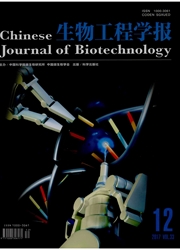

 中文摘要:
中文摘要:
为探讨表达猪流行性腹泻病毒(PEDV)核蛋白(N)基因的重组干酪乳杆菌口服免疫小鼠后诱导特异性免疫应答,本研究制备表达流行性腹泻病毒核蛋白的重组干酪乳杆菌,应用Western blotting、间接免疫荧光和全细胞ELISA鉴定目的蛋白的表达。然后用该重组干酪乳杆菌口服免疫BALB/c小鼠,分别测定了免疫后不同时间血清中特异性IgG、粪便中特异性的sIgA水平以及血清的中和活性;并测定免疫小鼠脾淋巴细胞增殖情况和细胞因子水平。结果显示,目的蛋白表达在细胞表面,可被阳性血清所识别。免疫小鼠后,可分别在血清中和粪便中检测到较高水平特异性IgG、sIgA(P〈0.01),但血清并没有中和活性;淋巴细胞增殖试验和细胞因子测定结果显示,免疫组可产生明显的细胞免疫应答。结果表明,该重组干酪乳杆菌表达系统可诱导小鼠产生黏膜免疫应答和系统免疫应答,具有作为口服疫苗潜在的应用价值。
 英文摘要:
英文摘要:
To evaluate the immune responses of recombinant Lactobacillus casei 393 expressing Porcine Epidemic Diarrhea Viral (PEDV) N protein as oral vaccine, n gene of PEDV was subcloned into the expression vector pPG-1, and then transformed into L. casei 393 by electroporation, resulting in recombinant strain pPG-I-n/L, casei 393.The recombinant strains were induced to express interest protein, which was detected by Western blotting, immunofluorescence microscopy and the whole bacteria ELISA. And then BALB/C mice were used as an animal model immunized with recombinant strains by oral administration, and the immune efficacy was analyzed. The recombinant PEDV N protein showed the antigenic specificity, and was located on the bacterial cell walls of pPG-1-n transformed L. casei. The results of ELISA showed that the mice immunized with recombinant strains could produce remarkable special slgA level in the feces, and high level of anti-PEDV N protein IgG in the serum (P〈0.01), but the induced antibodies in serum did not demonstrated neutralizing effect. Statistical significant difference was observed among the spleen lymphocyte proliferation index (LPI) among the immunization groups of mice and control groups. And there was significant increase of IFN-γ and IL-4 contents in the supematant of spleen cell culture in immunized group. In conclusion, the oral immunizations with recombinant L. casei 393 can induce significant specific mucosal PEDV N-specific IgA response as well as serum IgG responses, and can evoke both mucosal immune and system immune responses.
 同期刊论文项目
同期刊论文项目
 同项目期刊论文
同项目期刊论文
 期刊信息
期刊信息
